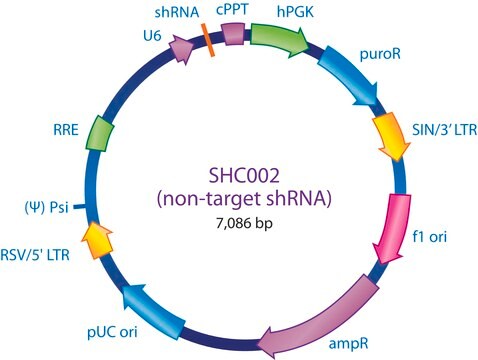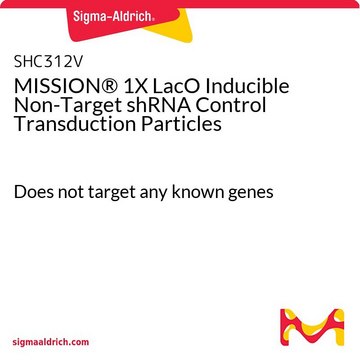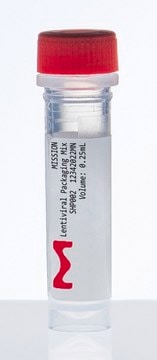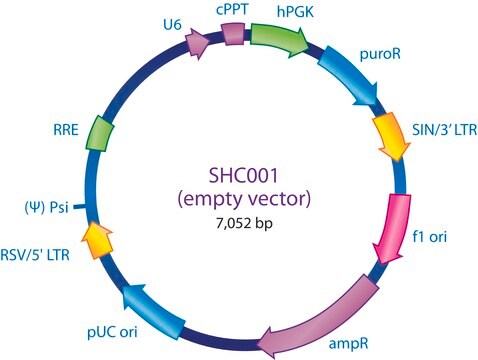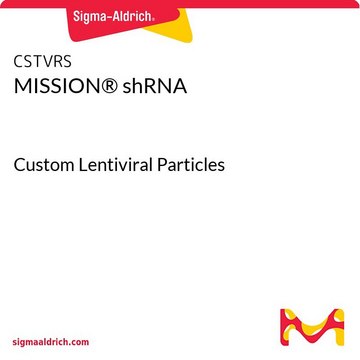SHC332V
MISSION® 3X LacO Inducible Non-Target shRNA Control Transduction Particles
Does not target any known genes
Anmeldenzur Ansicht organisationsspezifischer und vertraglich vereinbarter Preise
Alle Fotos(1)
About This Item
UNSPSC-Code:
41106609
NACRES:
NA.51
Empfohlene Produkte
Allgemeine Beschreibung
Sigma® is proud to offer IPTG-inducible vectors as the latest development from our continued partnership in TRC.
The pLKO vector has been redesigned to contain a LacI (repressor) and a modified human U6 shRNA promoter with LacO (operator) sequences. In the absence of IPTG (isopropyl-Β-D-thio-galactoside), an analogue of lactose, LacI binds to LacO preventing expression of the shRNA. When IPTG is present, the allosteric LacI repressor changes conformation, releasing itself from lacO modified human U6 promoter, and subsequently allows expression of the shRNA.
The MISSION 3x LacO Inducible Non-Target shRNA Control Transduction Particles contain an shRNA insert that does not target any known genes, making it useful as a negative control in experiments using the MISSION inducible shRNA library clones. This allows one to examine the effect of transfection of a short-hairpin on gene expression and interpret the knockdown effect seen with shRNA clones. Ampicillin and puromycin antibiotic resistance genes provide selection in bacterial or mammalian cells respectively. In addition, self-inactivating replication incompetent viral particles can be produced in packaging cells (HEK293T) by co-transfection with compatible packaging plasmids. 200 uL of 106 TU/ml (via p24 titering assay) lentiviral particles are provided as frozen stock.
When conducting experiments using MISSION® shRNA clones, the proper controls should be a key element of your experimental design to allow for accurate interpretation of knockdown results.
The pLKO vector has been redesigned to contain a LacI (repressor) and a modified human U6 shRNA promoter with LacO (operator) sequences. In the absence of IPTG (isopropyl-Β-D-thio-galactoside), an analogue of lactose, LacI binds to LacO preventing expression of the shRNA. When IPTG is present, the allosteric LacI repressor changes conformation, releasing itself from lacO modified human U6 promoter, and subsequently allows expression of the shRNA.
The MISSION 3x LacO Inducible Non-Target shRNA Control Transduction Particles contain an shRNA insert that does not target any known genes, making it useful as a negative control in experiments using the MISSION inducible shRNA library clones. This allows one to examine the effect of transfection of a short-hairpin on gene expression and interpret the knockdown effect seen with shRNA clones. Ampicillin and puromycin antibiotic resistance genes provide selection in bacterial or mammalian cells respectively. In addition, self-inactivating replication incompetent viral particles can be produced in packaging cells (HEK293T) by co-transfection with compatible packaging plasmids. 200 uL of 106 TU/ml (via p24 titering assay) lentiviral particles are provided as frozen stock.
When conducting experiments using MISSION® shRNA clones, the proper controls should be a key element of your experimental design to allow for accurate interpretation of knockdown results.
Anwendung
To see more application data, protocols, vector maps visit sigma.com/shrna.
Rechtliche Hinweise
MISSION is a registered trademark of Merck KGaA, Darmstadt, Germany
Sigma is a registered trademark of Sigma-Aldrich Co. LLC
Empfehlung
Produkt-Nr.
Beschreibung
Preisangaben
Lagerklassenschlüssel
12 - Non Combustible Liquids
WGK
WGK 3
Flammpunkt (°F)
Not applicable
Flammpunkt (°C)
Not applicable
Analysenzertifikate (COA)
Suchen Sie nach Analysenzertifikate (COA), indem Sie die Lot-/Chargennummer des Produkts eingeben. Lot- und Chargennummern sind auf dem Produktetikett hinter den Wörtern ‘Lot’ oder ‘Batch’ (Lot oder Charge) zu finden.
Besitzen Sie dieses Produkt bereits?
In der Dokumentenbibliothek finden Sie die Dokumentation zu den Produkten, die Sie kürzlich erworben haben.
M Pérez-Alea et al.
Oncogene, 36(41), 5695-5708 (2017-06-06)
Despite the promising targeted and immune-based interventions in melanoma treatment, long-lasting responses are limited. Melanoma cells present an aberrant redox state that leads to the production of toxic aldehydes that must be converted into less reactive molecules. Targeting the detoxification
Unser Team von Wissenschaftlern verfügt über Erfahrung in allen Forschungsbereichen einschließlich Life Science, Materialwissenschaften, chemischer Synthese, Chromatographie, Analytik und vielen mehr..
Setzen Sie sich mit dem technischen Dienst in Verbindung.

